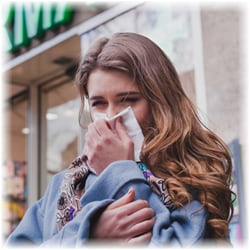3 Reasons Why You’re More Likely to Get Sick When the Seasons Change
 Every year when the temperature drops, it seems to bring about sickness that was nonexistent in the warmer months. Below are 3 reasons why this may be happening and some tips on how to prevent your annual winter cold.
Every year when the temperature drops, it seems to bring about sickness that was nonexistent in the warmer months. Below are 3 reasons why this may be happening and some tips on how to prevent your annual winter cold.
- Many of us tend to come down with a common cold or even the flu due to the changes in our weather and our activities. When the seasons change, so do our lifestyles. We move from sunny, warm, outdoor spaces to tightly packed indoor quarters, often with a lack of proper ventilation. Being closer together may increase the transmission of airborne droplets and pathogens.
- Our immune system is influenced by the weather and environment around us. Dry air, high winds, dropping temperatures and changing pollen counts all have effects on our bodies. These weather changes have been known to decrease our immune system, irritate our airways, and leave us vulnerable to infections and viruses.
- Lack of sunlight in the winter months has been known to increase the likelihood of getting sick. Both vitamin D and melatonin levels drop in the fall and winter seasons due to less sunlight and people spending less time outdoors. Vitamin D and melatonin are known to boost the immune system, produce killer cells in the body, and reduce inflammation.
Here are some practical tips from Winston Lai DO, a Family Medicine physician at PIH Health, on how to avoid getting sick this season change:
- Stay home if you are sick
- Avoid those who are sick
- Go outside, even if it’s just ten minutes a day
- Keep up or start a workout routine
- Eat a healthy diet to maintain a strong immune system
- Stay up to date on your flu and COVID-19 vaccines
Call your doctor’s office if symptoms worsen over time. To find a PIH Health doctor near you, visit: PIHHealth.org/Find-a-Doctor.